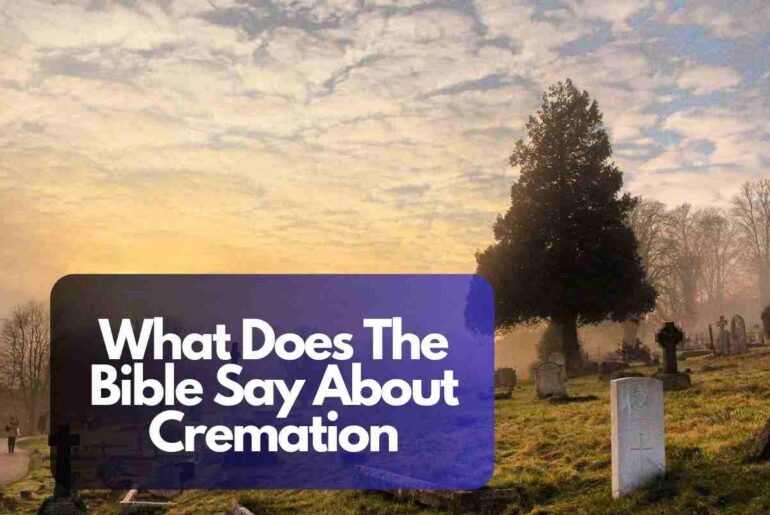The Bible serves as a cornerstone of faith for followers of Christianity, Judaism, and other religions. Within its pages, it not only narrates the history of mankind’s relationship with the divine but also imparts moral teachings and instructions for righteous living. However, the topic of cremation is not explicitly addressed in the Bible, which leaves room for interpretation and divergent opinions.
To understand the biblical stance on cremation, we embark on a journey through relevant passages and explore the cultural and historical context surrounding burial practices during biblical times. We examine key scriptural references that touch upon themes of life, death, and the treatment of the deceased, seeking to discern any implicit teachings or principles that may guide our understanding.
Contents
What Does The Bible Say About Cremation
Significance of the topic
The topic of what the Bible says about cremation holds significance for many individuals, particularly those who are Christians or have loved ones who are. Understanding the biblical perspective on cremation can help inform personal beliefs, decisions, and practices regarding end-of-life matters. It provides guidance and insights into how Christians can navigate this aspect of their faith and honor the deceased.
Brief overview of cremation and its relevance to Christianity
Cremation is a process of reducing the body of a deceased person to ashes through intense heat. It has become increasingly popular as a method of body disposal in various cultures and religions around the world, including among Christians. The relevance of cremation to Christianity lies in the fact that it raises questions regarding the compatibility of this practice with biblical teachings and principles. Christians often seek to align their actions with their faith, prompting the exploration of what the Bible says about cremation.
The exploration of this topic allows individuals to gain a deeper understanding of the biblical perspective on cremation, which can help inform their personal beliefs and practices related to death, burial, and the afterlife. It also encourages discussions and reflections on the broader concepts of mortality, resurrection, and the ultimate destiny of the soul as taught in Christianity.
Historical Context
Burial as the customary method in the Old Testament
In the Old Testament, burial was the predominant and customary method of handling the deceased. The practice of burying the dead is highlighted through various accounts and narratives. For example, Abraham purchased a burial site for his wife Sarah (Genesis 23:19), and Jacob requested to be buried in the cave of Machpelah (Genesis 49:29-33). These instances demonstrate the significance placed on burial as a respectful and honorable way to lay the dead to rest.
Instances of cremation in specific circumstances
While burial was the norm, there are instances in the Bible where cremation was employed as a means of body disposal, but these instances were often associated with specific circumstances. In certain cases, cremation was used during times of war or in response to extreme situations. For example:
1. Saul and his sons: After the death of Saul and his sons in battle, their bodies were cremated by the men of Jabesh-gilead as an act of respect (1 Samuel 31:11-13).
2. Achan: Achan, who had brought trouble upon the Israelites by disobeying God’s command, was stoned to death, and his body, along with his possessions, was burned with fire (Joshua 7:25).
3. King Josiah: When Josiah, a righteous king, died in battle, his body was brought back to Jerusalem, and it is believed that he was given a royal cremation before his bones were interred (2 Chronicles 35:24-25).
These instances illustrate that cremation was occasionally practiced in the Bible, but they were often associated with specific historical and cultural contexts rather than being presented as the preferred or prescribed method of body disposal.
Understanding the historical context of burial as the customary method and the occasional use of cremation in specific circumstances helps provide a broader perspective on the biblical understanding of body disposition. It indicates that while cremation was not the primary method of handling the dead in biblical times, there were instances where it was employed due to unique circumstances.
Biblical Passages and Perspectives
Genesis 3:19 – “By the sweat of your brow…”
1. Emphasizing the mortality of human beings: In Genesis 3:19, after Adam and Eve’s disobedience, God declares, “By the sweat of your brow you will eat your food until you return to the ground since from it you were taken; for dust you are and to dust you will return.” This verse emphasizes the mortality of human beings and the reality that our physical bodies will eventually return to the dust of the earth. It serves as a reminder of the temporary nature of our earthly existence and the certainty of death.
2. Interpretation suggesting alignment with cremation: Some interpret Genesis 3:19 as indicating a potential alignment with cremation. They argue that since cremation reduces the body to ashes, which are similar to dust, it can be viewed as a symbolic return to the earth as emphasized in this verse. This interpretation suggests that cremation aligns with the biblical truth that our bodies ultimately return to the elements from which they were formed.
1 Corinthians 15:50 – “I declare to you, brothers and sisters…”
1. Transformation of bodies at the resurrection: In 1 Corinthians 15:50, the apostle Paul discusses the transformation of our bodies at the resurrection. He states, “I declare to you, brothers and sisters, that flesh and blood cannot inherit the kingdom of God, nor does the perishable inherit the imperishable.” This passage emphasizes the spiritual transformation that occurs when believers are resurrected and receive glorified bodies. It highlights the eternal nature of the spiritual body that is different from the perishable physical body.
2. Diminishing significance of physical body disposal: The emphasis on the transformation of the body at the resurrection suggests that the method of physical body disposal after death may hold less significance in the grand scheme of things. The focus shifts from the physical remains to the spiritual reality and the eternal destiny of believers. This perspective can provide a broader context in which to consider the various methods of body disposition, including cremation.
By examining these biblical passages, we see that while the Bible does not explicitly address cremation as a preferred or prohibited method of body disposal, it offers insights and perspectives. These passages highlight the mortality of human beings, the transformation of the body at the resurrection, and the primacy of spiritual matters over physical body disposition. They encourage believers to prioritize the eternal destiny of the soul and the relationship with God rather than becoming overly preoccupied with the method of body disposal after death.
Focus on Soul and Spiritual Transformation
Primacy of spiritual matters in the Bible
Throughout the Bible, the primary focus is on the spiritual aspects of life rather than the physical. It emphasizes the importance of the soul and its relationship with God. Scriptures teach that our lives should be centered on cultivating a deep faith, seeking repentance for our sins, and living a godly and righteous life. The condition of our souls and our eternal destiny hold far greater significance than the method of body disposal after death.
Importance of faith, repentance, and godly living
The Bible repeatedly emphasizes the significance of faith in God and the transformative power of repentance. It teaches that salvation is attained through faith in Jesus Christ and repentance for our sins. The ultimate goal for believers is to live in accordance with God’s will, following His commandments and displaying the fruit of the Spirit. This focus on spiritual matters highlights the importance of cultivating a relationship with God and striving for a life of holiness and righteousness.
Lack of explicit instructions on the method of disposal
While the Bible addresses various aspects of human life, it does not provide explicit instructions on the method of body disposal after death. It does not prescribe burial or prohibit cremation as the sole acceptable method. This silence on the matter suggests that the Bible leaves room for personal judgment and cultural considerations when making decisions about the physical handling of the deceased.
The absence of explicit instructions indicates that the Bible places more emphasis on the spiritual aspects of life and the condition of our souls rather than the specific method of body disposition. It encourages believers to approach the topic of cremation or any other method of body disposal with thoughtful consideration, seeking guidance from God, and relying on personal convictions informed by biblical principles and wise counsel.
Conclusion
In examining the topic of what the Bible says about cremation, several key points emerge. The historical context reveals that burial was the customary method of handling the deceased in the Old Testament, with instances of cremation occurring in specific circumstances. Biblical passages such as Genesis 3:19 highlight the mortality of human beings and the interpretation that suggests alignment with cremation. 1 Corinthians 15:50 emphasizes the transformation of bodies at the resurrection, diminishing the significance of physical body disposal. The focus on soul and spiritual transformation underscores the primacy of spiritual matters in the Bible, the importance of faith, repentance, and godly living, and the lack of explicit instructions on the method of disposal.
Given the complexity and lack of explicit instructions, it is essential for individuals to engage in thoughtful consideration and prayerful discernment when it comes to the topic of cremation. Understanding the biblical principles and perspectives discussed can serve as a guide, but ultimately, personal convictions and beliefs should be formed through a sincere seeking of God’s guidance and wisdom.
Navigating the topic of cremation can be a deeply personal and sensitive matter. It is advisable to seek guidance from trusted spiritual advisors such as pastors, clergy members, or other wise individuals who can provide biblical insights and offer counsel. Engaging in conversations with those who have a solid understanding of the Bible and can help navigate the complexities of this topic can provide valuable guidance and support.








